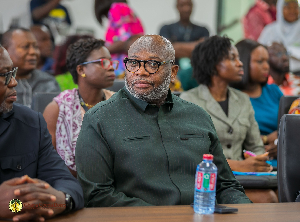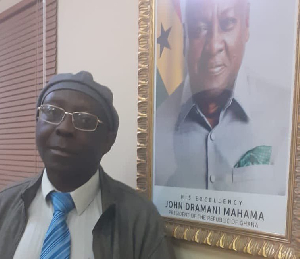Small-scale traders who are unable to read or write and for that reason cannot compose any business proposal on their own to attract funding will have no barrier concerns as government looks set to deliver loans to business applicants under the National Entrepreneurship and Innovation Programme (NEIP).
The Executive Director of the China Europe International Business School (CEIBS), Professor Mathew Tsamenyi, says the Ministry for Business Development, who has already invited proposals from entrepreneurs across Ghana to access the loan facility, also has plans to offer same financial aid to illiterate businesspersons without necessarily submitting written proposals to the NEIP Secretariat once they qualify for the support.
He disclosed this to the media at the launch of the “Business Plan Competition” organised by the Ministry for Business Development for owners of Small and Medium Enterprises (SMEs) in the Upper East region.
The event, held at the Tap Hotel in the regional capital, Bolgatanga, saw participants taken through ways they could sustain and grow their businesses with the NEIP loans government had packaged for disbursement to qualified applicants.
“There are different programmes under this NEIP business support. This is the first phase. There are other supports for traditional SMEs— the usual market women [and men] who cannot speak and write in English. They need support but the approach will be different. It’s a whole ecosystem we are looking at. There is a provision to support those people through what we call the Traditional SME Training and Support System,” assured Prof. Tsamenyi whose outfit (CEIBS) developed the curriculum for the NEIP and also provided the training for applicants across the country.
Equal Opportunities for Applicants
Government has, through the Ministry for Business Development, provided a seed capital of $10million to support SMEs under the NEIP to reduce poverty by creating sustainable jobs for themselves and others.
The NEIP also has engaged its Private Sector Implementation Partner (PSIP), the African SME Organisation, to scale up the $10million to $100million in the next three years in order to reach more SMEs and to sustain the NEIP initiative.
The launch of the Business Plan Competition in the Upper East region marked the end of training for applicants in the northern area of the country. Some 450 applicants took part in the training programme organised in the Northern region, whilst 140 contenders and 97 competitors partook at similar events in the Upper East region and the Upper West region respectively.
“This is first of its kind. You know, President Nana Akufo-Addo is somebody who is so passionate to see the lives of Ghanaians improved. And we are committed to ensuring that equal opportunities are given to all applicants who participate so that, in the end, whoever is benefitting would be benefiting on his or her own merit,” stated the Programmes Manager of the Ministry for Business Development, Yakubu Yussif.
Mr. Yussif, who represented the Minister for Business Development, Ibrahim Mohammed Awal, at the event, added: “We have monitoring mechanisms which we will apply to make sure that [loans paid out] are appropriately and efficiently used. Every region has its own peculiarities. Regional peculiarities are going to be considered alongside the standards we are using to make sure that [disbursement of loans] is equitable.”
Focus on your Local industry— Regional Minister tells Applicants
Addressing the gathering, the Upper East Regional Minister, Rockson Ayine Bukari, asked the applicants to direct their business plans at the local industry within the region.
“I wish to challenge business applicants and the programme in general to consider tapping into the many business avenues of this region. The arts and crafts, tourism and hospitality, artisanal and vocational areas present opportunities for development and growth and require needed backing. These are areas that also have ready market within the region and beyond and, when developed, could boost local economies around while breaking the cycle of poverty in the region.
“As beneficiaries, you should also work at promoting business thinking and development in the region. Many are those out there who still believe that it is the sole responsibility of government to create employment. Such people are unable to fathom the prospects of self-employment and we have to show the way by our exploits in business and social life,” the Regional Minister said.
Mr. Bukari also expressed confidence in the NEIP resource persons, saying, “Your ability to deliver quality training is not in doubt. Every potential SME should be able to stand on its feet with the knowledge and skills to be gained here.”
Business News of Thursday, 18 January 2018
Source: starrfmonline.com













